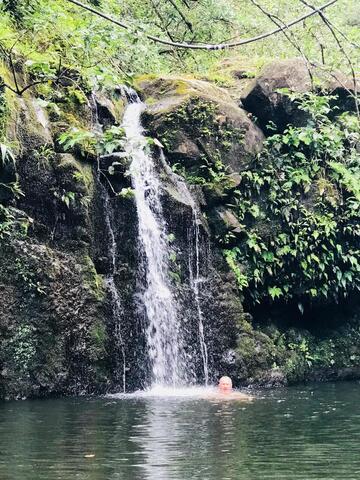
OK, this is going to be a bit strange. But that's why you scan Barnett's meanderings anyway, eh? My observation is that there are two distinct advantages to connecting with the basic conditions on our home planet.
Earth is fundamentally, first and foremost, a water place. Water-filled seas comprise two-thirds of the planet's surface, ceaselessly in motion. Our distance from the sun conveniently keeps these seas in the liquid condition permitting such movement, though not completely prohibiting the water's condensing into ice or expanding into vapor where conditions permit.
Two advantages to immersing yourself in this moving water. First, it's long been known that water in motion creates negative air ions, which physiologically interact with the brain to make humans happy, to the point of euphoria in some. No wonder we all like to sing in the shower! Want to be happy? Spend time around moving water (sorry, ponds don't work).
Secondly, if you want to be thoroughly "at home" on your home planet, you're well advised to connect up with its primary, fundamental attribute by spending time immersing yourself in the earth's primary pulse: water in motion. There're lots of ways to do this; allow me to recount a few of them that work for me.
Simplest and easiest: stand under water falling in a natural, fresh-air habitat. Hawaii offers this in spades (see photo), at least on the "wet" sides. But you don't have to go to Hawaii. Here in southern Arizona, you can find waterfalls in deep canyons of the mountains, such as Sabino Canyon National Park northeast of Tucson. Get off the shuttle taking you to the top of the canyon at stop number eight, climb up Sabino Creek a ways, and you'll find a wonderful waterfall under a cleft in the rocks, that often has a short line of happy people vying to enjoying standing under it. Ahhhh.
Or you can get horizontal in a rushing stream and let the water flow past you. A regular stop on my bicycle loop in Chico's Bidwell Park in California features a place where I can park my bike and clamber down to lay horizontally in Big Chico Creek there, in 12 to 18 inches of rapidly flowing water. I grasp a couple of largish rocks with my outstretched hands, and hold myself within the flow of the water past me—discovering that my body is whipped in an undulating rhythm by the water, and kinetically vibrating just as a cello's string vibrates by the force of the bow across the string. An interesting sensation, which varies according to the depth and the force of the water.
But best of all: placing myself in the flow of waves rolling into a stretch of beach in Hawaii or other coast. I do this in two situations. First, sitting in a tidepool's gravel bottom in 6 to 18 inches of water with lava ledges, overhangs, pools, and canals all around me, letting the incoming waves gently push and pull me back at forth as they wash in and out. I'm completely in the embrace of the ocean, with anemones, limpets, corals, sponges, urchins, and sea cucumbers either in sight within inches of me or out of sight for many feet all around me. These creatures are benefiting from the incoming waves bringing them food particles and oxygen-rich water. And me? As I sit there, being pushed and pulled back and forth by the waves, I'm completely within the embrace of the ocean, joining the abundant life of the sea in its dance with the never-ceasing rhythm of the oceans. Wonderful.
I like the above tidepool-sitting best of all, but another aspect of the experience occurs when I've snorkeled for 45 minutes along a stretch of the Maui coastline just east of Keawakapu Beach, and approach another stretch of beach often frequented by sea turtles. An array of large boulders complicate the entrance to this beach from the water, and a concrete pier juts out to form the immediate far side of the beach's approach through the rocks. I get onto the beach by snorkeling through the route the water "wants" to go. No way to micromanage this or bulldoze my way through—there lies injury. I just slow down, follow the zigzagging route where the water goes, respectfully negotiating the tricky parts with boosts or brakes from my flippers, and soon enough I'm sitting on the sandy beach in a foot of water, pretty tuckered out (Hey! I did this throughout my 70's!) but feeling wonderful, sitting there as the waves wash in and out, the sun warm on my skin, butterflies and dragonflies flying past me, just enjoying being part of the push and pull of the waves. Immersed in the Tao.
Try it, as and where you can. Doubtless you have your own version of getting in contact with the pulse of the planet; let me know, I'd enjoy hearing from you. And enjoy!
